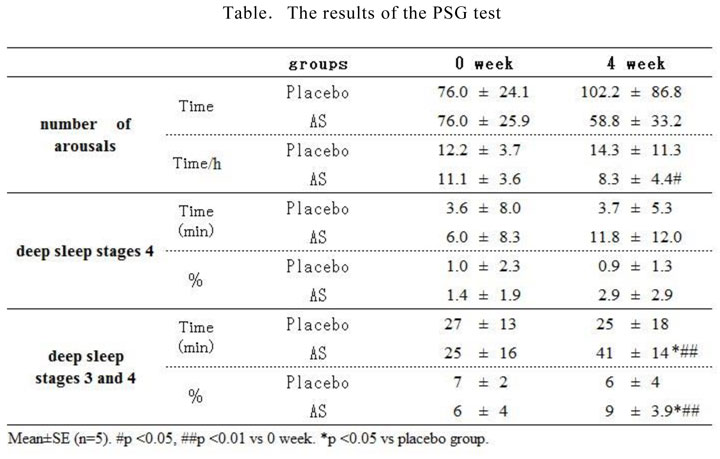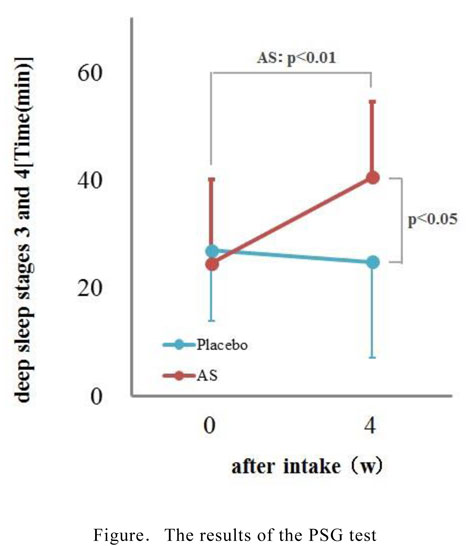- TOP
- List of reports
- The effect of Acanthopanax senticosus Harms on improving sleep quality
: randomized placebo-controlled crossover trial
The effect of Acanthopanax senticosus Harms on improving sleep quality : randomized placebo-controlled crossover trial
【Scientific information】
Research and Development Department, Sun Chlorella Corporation
The effect of Acanthopanax senticosus Harms on improving sleep quality
: randomized placebo-controlled crossover trial
(Published in the Journal of Japanese Society for Medical Use of Functional Foods (2014))
- Study Objectives
- Sleep is a physiological state that is essential for healthy living; nevertheless, the nocturnal
life style in which many people live in contemporary society can result in a shorter sleep
time or sleep-waking rhythm disorder. One in three Japanese elderly people are assumed to
be suffering from insomnia. Inhibited sleep may result in adverse effects on cerebral or
immunity functions, which may lead to the onset of depression or lifestyle diseases. It has
also been reported that reducing stress might result in improving the quality of sleep.
Thus, a study was conducted to examine the sleep improving effects of Acanthopanax senticosus (AS) in elderly people, which has showed significant effects in the previous studies, and the results were published in a medical journal.
- Method of experiments
- A double-blind, crossover comparative study was conducted in 5 male subjects (aged 46–70
years) who were dissatisfied with their sleep quality. They were given 40 tablets/day of the
AS food supplement made from AS root powder (AS group) or 40 tablets/day of the
placebo tablet (placebo group), 20 tablets each after breakfast and dinner for 4 weeks
separated by a 4-week washout period.
The sleep states of each subject at the start of administration and 4 weeks later were assessed by an all-night polysomnography (PSG) *1 test, and questionnaires using the Pittsburgh Sleep Quality Index (PSQI) *2 and OSA Sleep Inventory MA version*3.
- Results
- Based on the results of PSG, deep sleep (stages 3 and 4) significantly increased in week 4
compared with week 0 and the number of arousal reactions per hour significantly decreased
in the AS group. Deep sleep (stages 3 and 4) in the AS group also significantly increased
compared with that in the placebo group in week 4.
These results suggest that 4-week ingestion of Acanthopanax senticosus may improve the sleep quality in human with sleeping complaints.


Terminology
- *1: Polysomnography (PSG)
- This is a test for assessing the sleep state on a comprehensive basis. The method quantifies the depth
of sleep, fragmentary sleep or arousal responses, and sleep efficiency by measuring brain waves and
eyeball movements.
Sleep is divided into four stages, 1 to 4. Sleep stages 3 and 4 are deep sleep.
- *2: Pittsburgh Sleep Quality Index (PSQI)
- This is a questionnaire system in which subjects are asked about the states of sleep that they had, and such states are assessed according to the total score on 18 items. The lower the score is, the better the sleep quality is.
- *3: OSA Sleep Inventory MA version
- This is a questionnaire system in which subjects are asked about their feeling of sleep just after they wake up on 20 items. The higher the deviation is, the better the sleep quality is.
Publication in a scientific journal
- Name of journal:
- Journal of Japanese Society for Medical Use of Functional Foods, 2014
- Title:
- The effect of Acanthopanax senticosus Harms on improving sleep quality : randomized placebo-controlled crossover trial
- Presenters:
- Masako Hoshizaki1, Hideo Takekoshi1, Akira Noro2, Yoshimichi Kouzai2
- Affiliation:
- 1)Sun Chlorella Corporation,2)New Drug Development Research Center,Inc.





